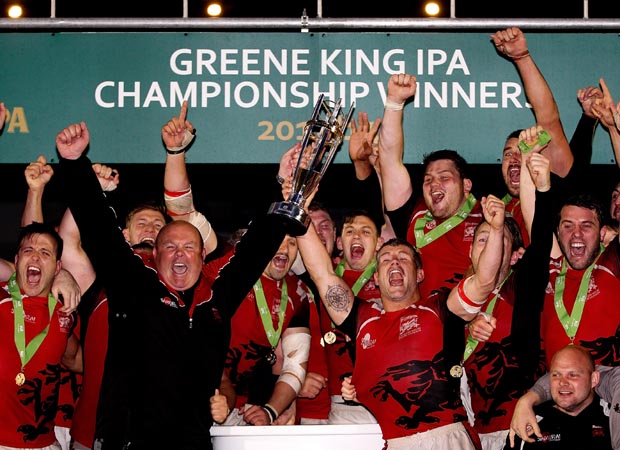 London Welsh's against-the-odds victory in the Championship final, beating runaway league leaders Bristol by a healthy 48-28 aggregate margin over two legs, has stirred up a hornets nest. It has seen the vanquished side's owner, Steve Landsdown, lambast the play-off system (see Neale Harvey's story on page 24), while the victors are determined to challenge the iniquitous Premiership funding rules.
London Welsh's against-the-odds victory in the Championship final, beating runaway league leaders Bristol by a healthy 48-28 aggregate margin over two legs, has stirred up a hornets nest. It has seen the vanquished side's owner, Steve Landsdown, lambast the play-off system (see Neale Harvey's story on page 24), while the victors are determined to challenge the iniquitous Premiership funding rules.
Both Bristol and London Welsh have legitimate reasons to feel aggrieved, and Premiership Rugby have serious issues which will drag the professional club game in England back into the law courts if they are not addressed as a matter of urgency.
It would be a safe bet to assume that London Welsh are the last club that Premiership Rugby wanted back in the top tier, because, by bouncing straight back up the season after they were relegated, they threaten the Premiership status quo on and off the pitch.
In their brief visit to the Premiership in 2012-13 London Welsh were combative in every respect.
Their successful legal challenge to Premiership Rugby attempting to use minimum standards criteria on stadia to block their promotion punched a hole in the ring-fence erected by the self-proclaimed ‘founder' clubs.
Furthermore, they were more competitive throughout that league season than the Worcester side relegated after this campaign, despite having to deal with the Tyson Keats eligibility furore and a five-point deduction.
My understanding is that the main movers and shakers at London Welsh, Kelvin Bryon, the club's main backer, and QC chairman, Bleddyn Phillips, view the funding discrepancy as something that has to to be challenged.
That is no surprise when you consider that as a promoted club without prior Premiership status they received c.£1.4m in funding two seasons ago, which was less than half the c.£3.5m available to the other Premiership clubs at that time.
Any objective assessor would conclude that that sort of protectionism, amounting to the deliberate handicapping of a promoted side, is unacceptable.
It is indefensible that a club, having battled their way through to the top tier through their deeds on the pitch, then find that the playing field they face off the pitch has been rigged with almost insurmountable financial obstacles.
England's elite league should be a competition played on a level playing field where central funding from Premiership Rugby is equal and, unlike the current shadowy ‘P' share arrangement, wholly transparent.
How effectively clubs spend that money on players, coaches and infrastructure is where the competitive element in a meritocratic system comes in.
It is also hard not to feel a great deal of sympathy for Bristol. After finishing top of the Championship league table for the third time (2010, 2012, 2014) they have been unable to clinch the deal for promotion, losing all three play-offs to clubs, who, like London Welsh, finished below them over the course of the regular season.
While it is legitimate to say that every club, including Bristol, knew what they had signed up to at the start of the season, Lansdown's questioning of a system in which there is no reward for a club which finished eight points above their closest rival in a 23-match league season is also legitimate.
The Bristol owner's suggestion that the current English Championship format should be replaced by one in which the Championship league leaders are promoted automatically, and that the second-place Championship club go in to a play-off against the 11th placed Premiership club, has a great deal of merit. It would bring a number of significant improvements.
Foremost, it recognises the natural justice of a club being rewarded fairly for their effort and consistency over an entire season.
The play-off would bring a further competitive edge to the Premiership, while also giving the clubs in English rugby's second professional tier the opportunity to fulfil their ambitions. As for the Premiership lower order, they also get a fair chance to keep their place at the top table.
Expecting the ring-fencers among the incumbent Premiership clubs to buy into the possibility of two teams coming up rather than one requires the arbitration skills of a saint.
However, anything that makes the Premiership a better and fairer competition with more variety and unpredictability, is going to make it more attractive as a spectator sport.
In addition, any Premiership club that are relegated have double the opportunity to get back into the elite league.
It is time for the management boards of the English Premiership and Championship clubs to earn their corn because there are improvements to be made – and far better that they are thrashed out in the board room than in the law courts.


























